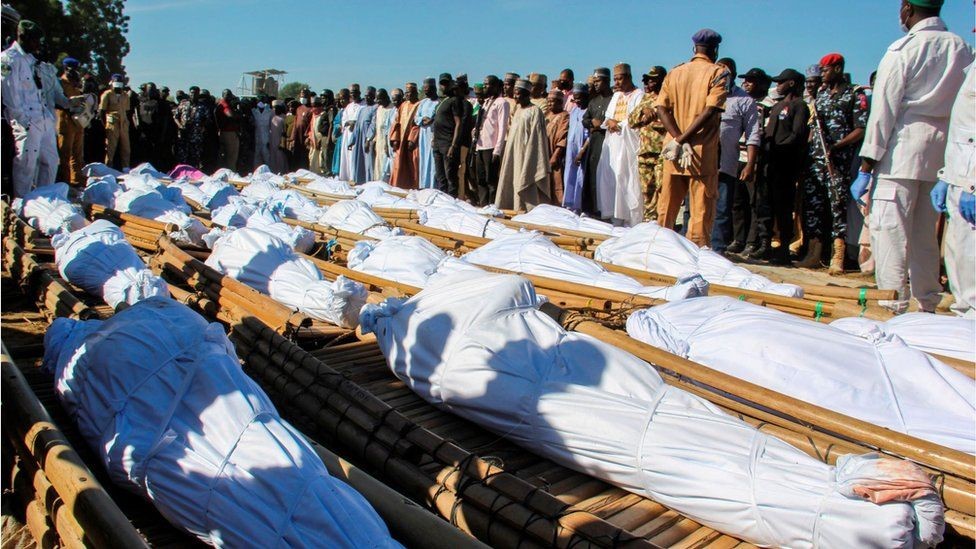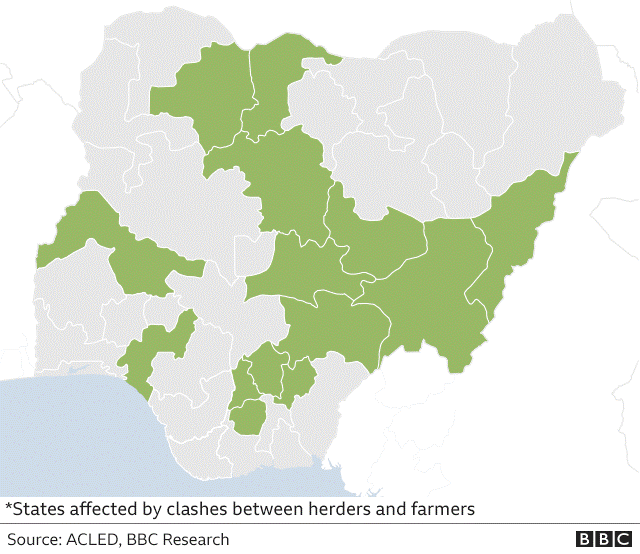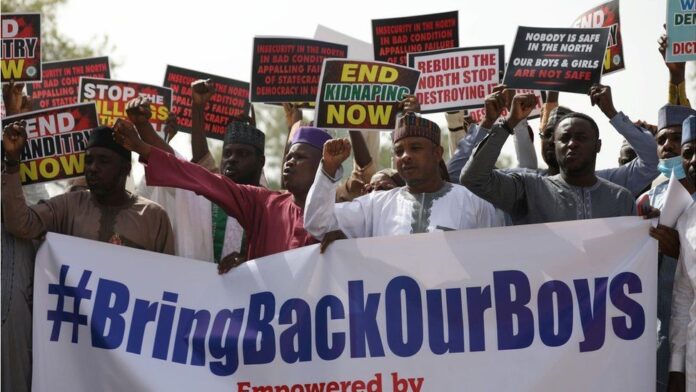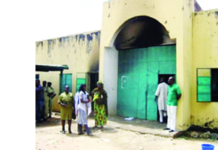By Jeph Ajobaju, Chief Copy Editor
Boko Haram insurgency has led to the closure of all primary and secondary schools in both Kaduna and Zamfara, and Adamawa is merely creaking by de-boarding 30 of its 34 junior boarding secondary schools “until further notice”.
UNICEF estimates that 1.3 million Nigerian children have been affected by frequent raids on schools by gunmen.
These are deposits of success for the Islamist terrorists who hate Western education and would rather no one attends school so that all Nigerians will be held down and become incapacitated street beggars, called Almajiris in the North.
There had been insurgency in the country before the emergence of Boko Haram in 2009. One in recent years is militancy in the Niger Delta which erupted in the early 1990s.
But the greater danger of Islamist jihadism is that it is a religious ideology that cannot be appeased except the targets convert to Islam and submit their lives and living to Islamic law, especially the draconian Shariah.
Islamist Jihadists want to rule Nigeria by force.
Wikipedia recounts that the current conflict in the Niger Delta first arose in the early 1990s over tensions between oil firms and a number of minority ethnic groups in the Deep South who feel they are being exploited, particularly the Ogoni and the Ijaw.
Theirs is an economic agitation which, for years, spiraled into kidnappings for ransom and blowing up oil pipelines, but has now simmered down after Abuja appeased them with amnesty, scholarships, oil bloc licences, and other carrots.
Niger Delta militants are still there and may rear up their heads with new threats if things go wrong. Nigeria also faces other security threats, as reported below by the BBC.
Different but overlapping security crises

Nigeria is faced with an unprecedented wave of different but overlapping security crises – from kidnapping to extremist insurgencies – almost every corner of the country has been hit by violence and crime.
Audu Bulama Bukarti, a senior analyst on Sahel security at the Tony Blair Institute, says the scale of the insecurity threatens the very fabric of Nigerian society: “With every attack, human lives are lost or permanently damaged and faith in democracy and the country is diminishing.”
When President Muhammadu Buhari was elected in 2015, he promised to protect citizens from terrorists and criminals. But there are less than two years left of his final term in office and the country is more unstable than it’s been in decades.
Some have linked the recent surge of insecurity to the staggering poverty across Nigeria. Youth unemployment currently stands at 32.5 per cent and the country is in the middle of one of the worst economic downturns in 27 years.
Here are Nigeria’s five biggest security threats:
Jihadism

Despite claiming during his first year in office that Islamist militant group Boko Haram had been “technically” defeated, Buhari now admits that his government is failing to stop the insurgency, which began in the north-east.
Indeed, Boko Haram is expanding into new areas and taking advantage of Nigeria’s poverty and other security challenges to fuel its extremist ideologies.
According to the UN, by the end of 2020, conflict with the group had led to the deaths of almost 350,000 people and forced millions from their homes.
Boko Haram launches deadly raids, in some cases hoisting its flag and imposing extremist rule on local people. It levies taxes on farms and the sale of agricultural products.
The once booming international fish market in the Chad Basin is now completely controlled by the group.

Dozens of farm labourers were slaughtered by Boko Haram last year
The challenge is made harder by Nigeria’s ungoverned spaces – areas that are remote and largely ignored, where groups can torment rural communities without fear of reprisal.
In recent years, a splinter faction allied to the Islamic State group, called the Islamic State’s West Africa Province, has surpassed Boko Haram in size and capacity. It now ranks among IS’s most active affiliates in the region.
Both groups have so far resisted the government’s military operations.
Clashes between herders and farmers
There have been violent disputes between nomadic animal herders and farmers in Nigeria for many years.
But disagreements over the use of land and water, as well as grazing routes, have been exacerbated by climate change and the spread of the Sahara Desert, as herders move further south looking for pasture.
Thousands have been killed in clashes over limited resources.
Benue State, in the centre of the country, has recorded the deadliest attacks. Recently, seven people were killed when gunmen opened fire on a camp for those fleeing the conflict. Some have also blamed herders for kidnapping people and demanding a ransom.

Mohammed Akdeef is one of many farmers to have fled their homes
The tension has led to some state governors banning grazing on open land, and thus creating friction with the central government.
In 2019, federal authorities launched a 10-year National Livestock Transformation Plan to curtail the movement of cattle and boost livestock production in an attempt to stop the conflict. But critics say a lack of political leadership, expertise and funding, plus delays are derailing the project.
Banditry and kidnapping
One of the scariest threats for families in Nigeria is the frequent kidnapping of schoolchildren from their classrooms and boarding houses.
More than 1,000 students have been abducted from their schools since December 2020, many only released after thousands of dollars are paid as ransom.
Some of the kidnappers are commonly referred to as “bandits” in Nigeria. These criminals raid villages, kidnap civilians and burn down houses.
Attacks by bandits have forced thousands of people to flee their homes and seek shelter in other parts of the country.
The north-west is the epicentre of these attacks.
In Zamfara state alone, over 3,000 people have been killed since 2012 and the attacks are still going on. Hundreds of schools were closed following abductions at schools in Zamfara and Niger state, where children as young as three years old were seized.
By every indication, Nigeria’s lucrative kidnapping industry is thriving – aexpanding into previously safe areas – and seemingly beyond the control of the country’s army. It poses a real threat to trade and education, as well as the country’s farming communities.
Separatist insurgency
A separatist group called the Indigenous People of Biafra (IPOB) has been clashing with Nigeria’s security agencies. IPOB wants a group of states in the south-east, mainly made up of people from the Igbo ethnic group, to break away and form the independent nation of Biafra.

Buhari has vowed to crush IPOB
The group was founded in 2014 by Nnamdi Kanu, who was rearrested in July and is facing trial on terrorism and treason charges. His rearrest has been a major blow to the movement.

The idea of Biafra is not new. In 1967, regional leaders declared an independent state, which led to a brutal civil war and the death of up to a million people.
Supporters of Kanu’s movement have been accused of launching deadly attacks on government offices, prisons and the homes of politicians and community leaders.
Buhari has vowed to crush IPOB. In June, he tweeted that “those misbehaving today” would be dealt with in “the language they will understand”.
The post was removed by Twitter for violating its rules after Buhari faced a backlash online. The incident led to the suspension of Twitter in Nigeria.
Oil militants

Well-armed militants staged numerous attacks on oil installations in the early 2000s
In the oil-producing south, security challenges are nothing new.
It is Nigeria’s biggest foreign export earner, and militants in the Niger Delta have long agitated for a greater share of the profit. They argue the majority of the oil comes from their region and the environmental damage caused by its extraction has devastated communities and made it impossible for them to fish or farm.
For years, militants pressured the government by kidnapping oil workers and launching attacks on security personnel and oil infrastructure, like pipelines.
To address this, former president Umaru Yar’Adua launched a presidential amnesty programme in 2009, which saw the formal end of the Niger Delta militants.
But armed cult groups still pose a security challenge in the region and industry officials have been warning that militancy is once again picking up.














